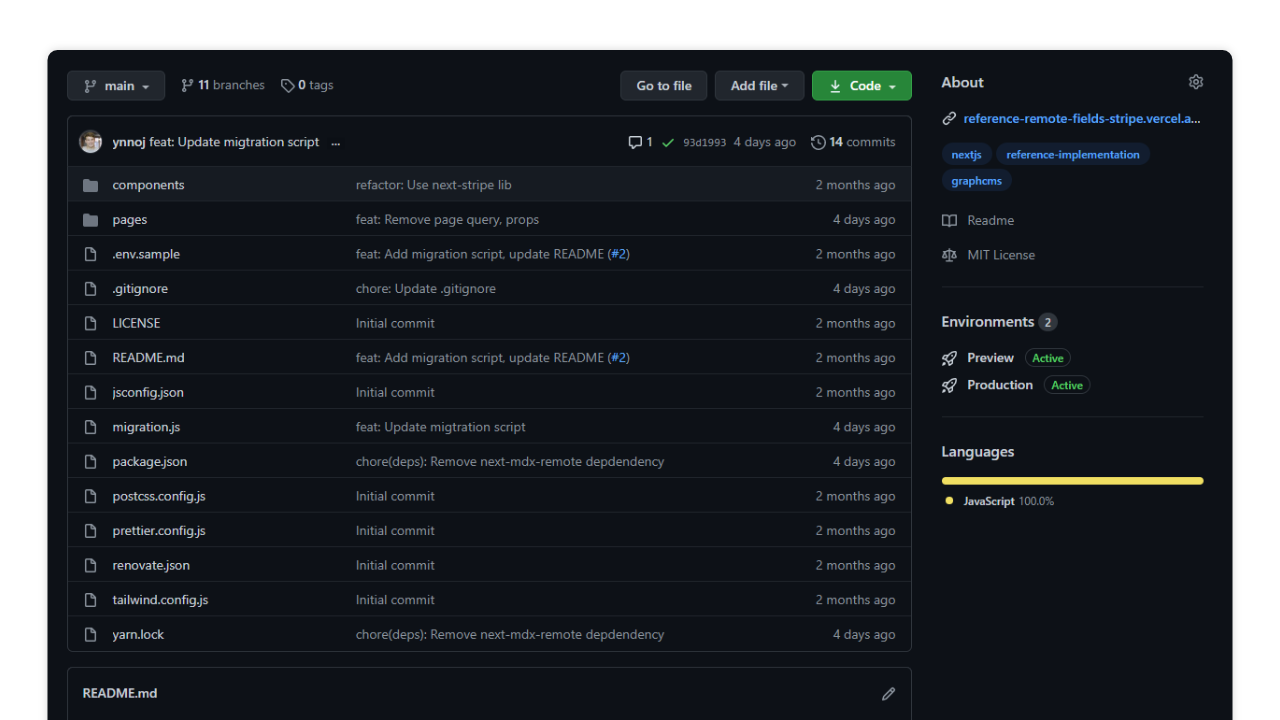We've just rolled out our March product release with everything you need to know about it. We've also had some great instances of GraphCMS in the Wild trickle in from the community.
TL;DRAnchor
- We rolled out the official GraphCMS integration for Gatsby Cloud, along with some big updates to the
graphcms-source-pluginto keep up with Gatsby v3. - Jamie's been working on tons of new videos to make it even easier to get started with GraphCMS.
- Jonathan dropped an exciting application of Content Federation, by querying product and price data from Stripe using Remote Fields.
The community dropped tons of exciting projects this month, including a podcast and a GraphCMS plugin, among much more.
Announcing the official GraphCMS integration for Gatsby Cloud!Anchor
For all our users building their projects on Gatsby Cloud, we're thrilled to announce our official native integration for Gatsby Cloud! The Gatsby Cloud integration allows you to seamlessly update your static deployments at the push of a button from within GraphCMS itself. Take it for a spin and share your feedback with us.
Building on top of this, we've made some updates to the gatsby-source-graphcms plugin, primarily to handle images better when bumping up to Gatsby v3.
Take the integration for a spin!
How to GraphCMSAnchor
Jamie's been busy creating several new videos to master GraphCMS. Going over all the individual field types and extending the asset model, all the way to using our Management SDK, this playlist covers everything you need to know when working with GraphCMS.
Content Federation in the real worldAnchor
When we rolled out Remote Fields as part of our narrative on "Content Federation", there were several exciting ideas on what possibilities this could unlock for Headless CMS. One of these is to query product and price data from Stripe.
This reference by Jonathan is a basic example of Content Federation, using Remote Fields to connect a PricingPlan type with third-party product and pricing data from Stripe. A common use case would be to enrich recurring or one-time Stripe products with data from GraphCMS (such as images or additional text content).
From the CommunityAnchor
The past month has been one of the most exciting to see what the community's been working on. Here are some incredible examples we've put together:
Podcasts, powered by GraphCMSAnchor
Michele hosts Inference Podcast, and wanted to upload new episodes on Spotify. The problem? Spotify only accepts external RSS feeds, and most external services get costly quickly. The solution? Whip up a new project using the GraphCMS Podcast starter, and generate that RSS using our API.
A job board for FinTech jobsAnchor
Eric's been a member of the GraphCMS community for a while, and recently shared what he's been working on - Fintechry. As a job board for the FinTech industry, they use GraphCMS to curate the best fintech jobs for those looking to start their career in financial technology like payments, digital banks, mobile wallets, and more.
A free course with lessons focusing on GraphCMSAnchor
Marcelo has a passion for content modeling and Headless CMS, and makes a strong argument for the "intent" of content. His Headless Creator platform provides continuous learning (completely free) for anyone interested in working with a Headless CMS. With regular updates to the course and a brand new "Focus on GraphCMS" track, Marcelo puts a ton of thought and care into each episode, be sure to check it out, and register.
An argument for choosing GraphCMSAnchor
Mathias took some time to write about his process when choosing a Headless CMS, and what compelled him to finally decide on GraphCMS. What really mattered most was to have a central repository where everyone could have their content living in one place. Another essential aspect was being able to deliver content to several frontends, like their website, and iOS / Android apps. Finally, they definitely needed GraphQL given their site was built using Gatsby, so GraphCMS emerged as an ideal choice.
Mathias goes into depth about the process, the considerations, and the differentiators that led to this decision, which make for a really interesting read.
A shiny new portfolioAnchor
Rishi pushed out a shiny new portfolio with a calming aesthetic. Built using Next.js, SASS, and Framer Motion, all the content is served from GraphCMS, making for a ridiculously high-performance portfolio.
A plugin to migrate from static markdownAnchor
Giacomo was recently migrating his blog to GraphCMS and couldn't find a simple solution to move over all his static markdown files into GraphCMS, so he built one. Rather than deal with going from markdown to .csv or JSON, and back to markdown, this package aims to help the migration and make things much simpler. You can give the migrator a folder full of .md files and it will try to create a Post entry on your GraphCMS project - one entry for each .md file it encounters. Simple enough.
If anyone's keen on contributing, the repo is open-sourced and you can dive right in.
Typescript support for @graphcms/react-imageAnchor
A little-known fact is that we maintain @graphcms/react-image (previously graphcms-image), an image optimizing repo using the Filestack API, inspired by and based on gatsby-image. Written 100% in JavaScript, Daniel took some time to make some improvements. He works a lot with Next.js, Gatsby, and other React Apps, but they're all written in TypeScript. So rather than continue to create a d.ts file in each project with the specs for this package, he extended the repo by adding TypeScript support to remedy that and dropped in the supporting documentation 😍.
That's all for now. We've got so many exciting rollouts planned for the coming weeks that I'm excited to share soon!

